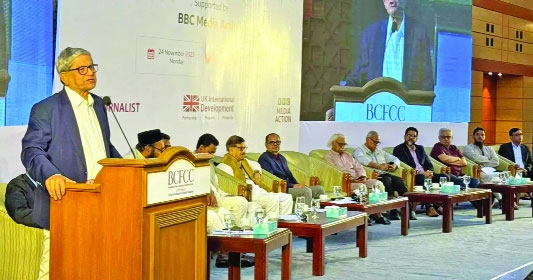Published: 02:13 AM, 25 November 2025 Last Update: 02:20 AM, 25 November 2025
We want to see an independent and free mass media: Mirza Fakhrul

Stating that journalists themselves end up in the pockets of politicians due to divisions among them, BNP Secretary General Mirza Fakhrul Islam Alamgir on Monday said his party is committed to ensuring a free and independent press if it is voted to power through the next national election.
"Our commitment is very clear, as in our 31-point outline we clearly stated that we want to see and build an independent and free mass media. That is why at that time we committed to forming a commission for this purpose," he said while speaking at a views exchange meeting.
The BNP leader said the interim government formed a media reform commission, but unfortunately the report prepared by the commission has not been discussed anywhere.
He promised that if the BNP is entrusted by the people with the responsibility to run the government, the party will take the issue as a priority, reports UNB.
"I must say one thing that you journalists have many unions like BFUJ and DUJ, and within those, there are divisions linked to the two (major) political parties. So, you yourselves are becoming partisan," Fakhrul observed.
He said political parties do not want journalists to become partisan or remain in their pockets. "But if you willingly put yourselves in their pockets that becomes a problem… We have seen that over the past 15 years many of you, on your own initiative, have supported fascism. We have seen it, and the people of this country have seen it."
The BNP leader said journalists need to commit to staying away from political influence and to practising independent journalism according to their professional ethics.
Broadcast Journalist Centre (BJC) organised the programme titled Consultation on Media Reform at the Bangladesh-China Friendship Conference Centre.
Fakhrul said most of the panelists focused on media freedom and the protection of journalists. "It seems to me that whether we talk about journalism, the education system or independent media-everything ultimately depends on the basic structure of the state."
He said extensive discussions were held and several commissions were formed as the country moved through a transition-shifting from a fascist system towards a democratic one.
"At that time, the issue of media freedom, especially in broadcasting, became extremely important. But my point is that the media cannot be seen as an isolated island. This country, its structure, those of us in government or in the opposition, and those working in journalism-everything is connected. That's why I believe that unless we take reform to heart, accept it and genuinely want change, I am not sure how far reforms can truly succeed," Fakhrul said.
He said the BJC proposal includes recommendations for a separate law for broadcast media, a national broadcast commission, a wage board and job security, declaring all TV channels as pay channels and recognising them as an industry, clearly defining TV licensing rules and ownership structures, and adopting a code of ethics and political commitments for broadcast media.
"If we are elected by the people and can form the government, your proposals will be given priority," the BNP leader said.
He recalled that when the one-party Baksal system was imposed in 1975, all newspapers except four were shut down and those that remained were under government control.
From that situation, Fakhrul said, when BNP founder the late President Ziaur Rahman took charge of running the country, he established a system of free and independent press, allowing many newspapers to emerge and operate freely.
Later, he said, whenever the BNP took on the responsibility of governing, it introduced many measures to improve and modernise the media sector. "The work that eventually led to the television channels we see today also began during that period."



